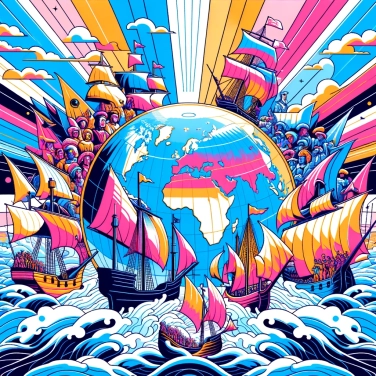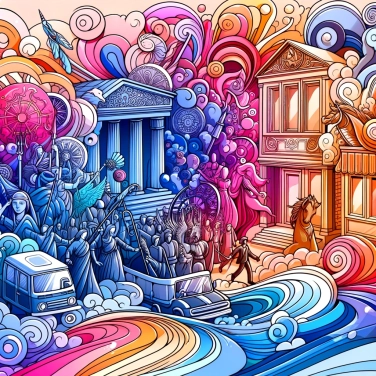The discovery of America by Christopher Columbus revolutionized global cultural and economic exchanges by opening up new maritime routes, allowing the trade of exclusive commodities such as corn, potatoes, and tobacco, and leading to population transfers, technology transfers, and knowledge exchanges between continents.

Before Christopher Columbus, global trade primarily revolved around the Silk Road connecting Europe to Asia. However, upon landing in America, Columbus completely redrew the map and trade routes. As a result, Europeans began creating new transatlantic sea routes to exploit American resources and feed their market. Consequently, this caused a major shift: the Mediterranean, the traditional commercial center, became less important, while the Atlantic emerged as the dominant strategic space. Very quickly, Spain and Portugal became key players due to their wealth from America. Other European countries, such as France, England, and the Netherlands, followed suit by developing their own trade networks. Ultimately, the emergence of the Atlantic as a new hub of global business led to a genuine globalization of trade, thus laying the foundations for modern international commerce.
When Christopher Columbus arrived in America, he quickly triggered agricultural exchanges never seen before. Europe discovered, among other things, corn, potatoes, tomatoes, cocoa, and vanilla. These foods profoundly transformed the eating habits of Europeans; for example, the potato soon became popular due to its low cost and ease of cultivation.
Conversely, Europeans introduced wheat, sugar cane, and coffee to America. The cultivation of these products gradually led to the establishment of large plantations, which greatly boosted the colonial economy, but unfortunately also favored slavery.
Alongside this, natural resources like gold and silver, whose exploitation exploded with the arrival of the Spaniards, fueled a colossal international trade between Europe, America, Africa, and Asia. These new trade routes permanently altered the global economy, connecting the continents for the first time sustainably around a common network of exchanges.
The encounter between Europeans and Indigenous peoples disrupted societies on both sides of the Atlantic. Europeans discovered civilizations with customs, beliefs, and practices quite different from their own. They often imposed their lifestyle, Christian religion, and traditions on Indigenous peoples, sometimes violently. However, the exchanges were not one-sided: European culture also enriched itself by adopting certain words, medical knowledge, agricultural practices, or American eating habits. These encounters profoundly altered the daily lives and beliefs of the populations, permanently transforming cultural identities on both continents.
From the discovery of Christopher Columbus, Europeans finally understand that the Earth is much larger than they had imagined. This completely challenges traditional maps: new lands emerge, such as America, shaking up knowledge that had been based almost solely on ancient writings. Explorers like Magellan then circumnavigate the globe, confirming along the way that the Earth is spherical and that there is indeed a route to Asia by the west. All these discoveries prompt scholars to question old theories, stimulate scientific curiosity, and allow for the development of more accurate navigation techniques – such as the improvement of the compass and the later invention of the sextant. This marks the beginning of a true revolution in the way of seeing the world, quietly but surely paving the way for modern scientific inquiry.
The discovery of America by Christopher Columbus completely changed the global balance. European countries such as Spain, Portugal, and later France and England embarked on a true race for colonization to dominate these new territories. The result: unprecedented rivalry and regular wars for control of these unexpected riches. The enormous flow of gold and silver from America to Europe changed the economic landscape by causing huge inflation. Prices soared, trade intensified, and Europe became the economic center of the world for several centuries. This new economic dynamism also led to the establishment of the triangular trade, exchanging slaves, goods, and raw materials between Europe, Africa, and the American colonies, leaving deep marks that still influence global relations today.
Chocolate, derived from cacao beans native to Central America, was initially consumed only as a bitter beverage by pre-Columbian civilizations and was later popularized and sweetened in Europe through transatlantic trade.
Before the discovery of America, the tomato, now a symbol of Italian cuisine, was unknown in Europe. Upon its arrival, it was even considered toxic for a long time before becoming essential in Mediterranean kitchens.
The term 'Indians' applied by Christopher Columbus to the indigenous peoples is the result of a geographical error: Columbus believed he had reached the Indies in Asia and thus mistakenly referred to the populations he encountered.
The rediscovery of America by Europeans caused considerable inflation in Europe during the 16th century due to the massive influx of gold and silver from American mines, a phenomenon known as the 'Price Revolution'.
The voyages of Christopher Columbus paved the way for significant encounters between European, African, and Native American cultures. These exchanges led to mutual influences in the fields of art, religion, languages, and traditions, thereby shaping culturally mixed societies.
The opening of the Atlantic routes allowed for the rise of international trade, particularly enriching the European powers. The massive influx of silver and gold from the New World stimulated the development of a monetary economy in Europe, but also caused significant inflation known as the "price revolution."
The discovery of a new, previously unknown continent challenged certain established knowledge in Europe. This contributed to fostering a critical mindset, a reexamination of traditional maps, and significant advancements in cartography, astronomy, navigation, and natural sciences.
The discovery of America was followed by intense rivalries among European powers such as Spain, Portugal, France, England, and the Netherlands. This led to conflicts over the control of territories and American wealth, profoundly altering the political balances in Europe and worldwide in the long term.
After the discovery of America, new agricultural products such as potatoes, corn, tomatoes, cocoa, vanilla, and tobacco were introduced to Europe. This agricultural transfer, known as the "Columbian Exchange," profoundly changed European dietary and agricultural habits.

0% of respondents passed this quiz completely!
Question 1/6